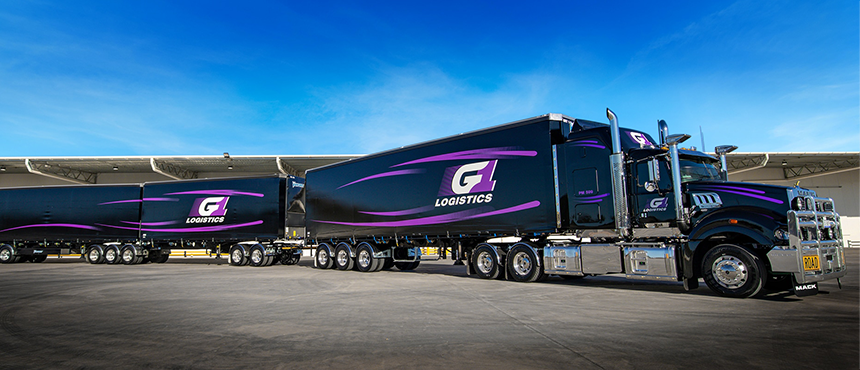The GCM limits of each PBS Level
While Performance Based Standards (PBS) allows for innovative, high-productivity vehicles, there are limits to the maximum possible Gross Combination Mass (GCM) at each level. There are two standards, which cause this: Gradeability A and Pavement Horizontal Loading. An explanation of each standard and the maximum possible GCMs to meet them are detailed in this article.
Disclaimer: Some networks have existing mass restrictions that are independent of limits stated below. Route specific access may be required to operate on desired roads. It is also possible to seek exemptions from the Gradeability A and Pavement Horizontal Loading Standard. If granted, route specific access is required to operate at higher masses.

Photo credit: Vawdrey Australia
The Gradeability A standard measures the maximum upgrade in which a vehicle can maintain forward motion. This standard is predominately governed by the amount of friction available at the hauling unit (i.e. truck or prime mover) drive group.
PBS assessment rules dictate that when conducting this test, a surface coefficient of friction of no more than 0.80 can be used, and that the vehicle must be loaded to its maximum laden mass. Additionally, the new generic tyre approach does not currently allow for the use of low rolling resistance tyres. As such, to meet Gradeability A, each PBS Level has a ceiling on the maximum Gross Combination Mass (GCM) achievable. These are shown in Table 1.
Table 1. Maximum GCM at each PBS Level to meet the Gradeability A Standard
|
Maximum possible GCM to meet |
|||
|
PBS Level |
Single drive at 9.0 tonnes |
Tandem-drive at 17.0 tonnes |
Tri-drive at 22.5 tonnes |
|
Level 1* |
34.8 |
65.8 |
87.1 |
|
Level 2 |
46.0 |
86.9 |
115.0 |
|
Level 3 |
57.0 |
107.6 |
142.5 |
|
Level 4 |
83.5 |
157.7 |
208.7 |
*PBS Level 1 is subject to a 50.5-tonne gross mass limit, when including the 6.5-tonne steer axle concession.
The Pavement Horizontal Loading Standard (PHLS) is used to regulate road wear. To reduce the tractive forces of the drive axle(s) on pavements, the PHLS places limits on the maximum permitted GCM for each PBS Level. These are summarised below in Table 2.
Table 2. Maximum permitted GCM to meet Pavement Horizontal Loading Standard at each PBS Level
|
Maximum permitted GCM to meet |
|||
|
PBS Level |
Single drive |
Tandem-drive |
Tri-drive |
|
Level 1* |
35.0 |
70.0 |
N/A |
|
Level 2 |
45.0 |
85.0 |
|
|
Level 3 |
45.0 |
110.0 |
|
|
Level 4 |
45.0 |
150.0 |
|
*PBS Level 1 is subject to a 50.5-tonne gross mass limit, when including the 6.5-tonne steer axle concession.
Notably, the PHLS does not place any GCM restrictions on combinations with tri-drive hauling units. This represents an opportunity for operators to run at the GCMs described in Table 1 while meeting all standards.
For more information and to discuss opportunities to unlock more productivity, contact Advantia today.
Get more like this in your inbox
Subscribe to our Newsletter and never miss a post.